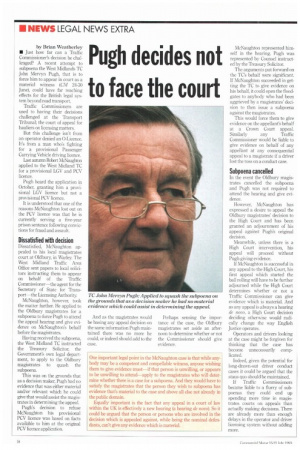Pugh decides not to face the court
Page 20

If you've noticed an error in this article please click here to report it so we can fix it.
by Brian Weatherley • Just how far can a Traffic Commissioner's decision be challenged? A recent attempt to subpoena the West Midlands TC John Mervyn Pugh, that is to force him to appear in court as a material witness (CM 24-30 June), could have far reaching effects for the British legal system beyond road transport.
Traffic Commissioners are used to having their decisions challenged at the Transport Tribunal; the court of appeal for hauliers on licensing matters.
But this challenge isn't from an operator denied an 0-Licence. It's from a man who's fighting for a provisional Passenger Carrying Vehicle driving licence.
Last autumn Robert McNaughton applied to the West Midland TC for a provisional LGV and PCV licence.
Pugh heard the application in October, granting him a provisional LGV licence but not a provisional PCV licence.
It is understood that one of the reasons McNaughton lost out on the PCV licence was that he is currently serving a five-year prison sentence following convictions for fraud and assault.
Dissatisfied with decision
Dissatisfied, McNaughton appealed to his local magistrates court at Oldbury, in Warley. The West Midland Traffic Area Office sent papers to local solicitors instructing them to appear on behalf of the Traffic Commissioner—the agent for the Secretary of State for Transport—the Licensing Authority.
McNaughton. however, took the matter further. He applied to the Oldbury magistrates for a subpoena to force Pugh to attend the appeal hearing and give evidence on McNaughton's behalf before the magistrates.
Having received the subpoena, the West Midland TC instructed the Treasury Solicitor, the Government's own legal department, to apply to the Oldbury magistrates to quash the subpoena.
This was on the grounds that as a decision maker, Pugh had no evidence that was either material and/or relevant which he could give that would assist the magistrates in determining the appeal.
Pugh's decision to refuse McNaughton his provisional PCV licence was based on facts available to him at the original PCV licence application. And as the magistrates would be basing any appeal decision on the same information Pugh maintained there was no more he could, or indeed should add to the case. Perhaps sensing the importance of the case, the Oldbury magistrates set aside an afternoon to determine whether or not the Commissioner should give evidence. McNaughton represented himself in the hearing. Pugh was represented by Counsel instructed by the Treasury Solicitor.
The arguments put forward on the IC's behalf were significant. If McNaughton succeeded in getting the TC to give evidence on his behalf, it could open the floodgates to anybody who had been aggrieved by a magistrates' decision to then issue a subpoena against the magistrates.
This would force them to give evidence on the appellant's behalf at a Crown Court appeal.
Similarly any Traffic Commissioner would be liable to give evidence on behalf of any appellant at any consequential appeal to a magistrate if a driver lost the toss on a conduct case.
Subpoena cancelled
In the event the Oldbury magistrates cancelled the subpoena and Pugh was not required to attend the hearing and give evidence.
However, McNaughton has expressed a desire to appeal the Oldbury magistrates' decision to the High Court and has been granted an adjournment of his appeal against Pugh's original decision.
Meanwhile, unless there is a High Court intervention, his appeal will proceed without Pugh giving evidence.
If McNaughton is successful in any appeal to the High Court, his first appeal which started the ball rolling will have to be further adjourned while the High Court determines whether or not a Traffic Commissioner can give evidence which is material. And as any appeal is always a hearing de novo, a High Court decision deciding otherwise would radically change the way English Justice operates.
Operators and drivers looking at the case might be forgiven for thinking that the case has become unnecessarily complicated.
Indeed, given the potential for long-drawn-out driver conduct cases it could be argued that the staus quo should be maintained.
If Traffic Commissioners became liable to a flurry of subpoenas they could end up spending more time in magistrates courts on appeals than actually making decisions There are already more than enough delays in the operator and driver licensing system without adding more.




















































































